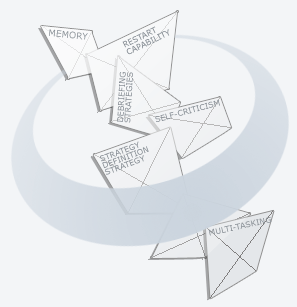Knowledge you can build upon
Practice and Theory Fragments

"I Opt" instrumentation and Organizational Engineering are continually reaching out into new areas. The focus of this effort is to construct a comprehensive overarching theory and then to convert the concepts into practical tools useful in the "real" world.
The high speed of new developments can cause many fragments to be "left on the floor." These are items of merit but not enough gain to warrant reopening the larger effort for revision. The purpose of this section is to capture and document these insights. Many could prove useful in addressing particular field situations.
Institute members are invited to contribute their own insights and elaborations. You will be identified by name (if you wish) and with contact information (if you choose). Use the Contact Page to send us the contribution in any way you choose (phone, mail, email, etc.)
Current Topics: (click on any of the following hyperlinks to view the entry)
- Memory
"I Opt" strategic styles have information retention bias "built-in." This fragment outlines one basis of the bias.
- Restart Capability
Strategic styles have an inherently different ability to tolerate interruptions.
- Debriefing Strategies
The optimal debriefing strategy varies by strategic style. "Management" style is also directly affected.
- Self-Criticism
People can experience negative self-judgment based on their "I Opt" strategic pattern.
- "Strategy Definition" Strategy
A problem can arise when their are multiple strongly committed HAs in a group. Each HA can view an issue from a somewhat different perspective.
- Relation to Psychology
"I Opt" and Organizational Engineering are shown to be a scientific precondition to Psychological science.
- Multi-Tasking
Multi-tasking is a mode based strategy. It applies to the RS and LP styles. Both can multi-task but in different ways and over different durations.
- Control for Over-Analysis
Over-analysis will arise from a density of people using an HA strategic style. This exposure can be controlled through a simple process.
- Defocus Strategy
Groups can become mired in debilitating conflict based on minor matters. This explains one cause and offers a strategy for controlling the exposure.
- Ratification Strategy
Group decision making is heavily influenced by the size of the group. This article outlines a process for using group decision processes in larger teams.
- The Downside of Focus
Focus is not a universal good. Applied indeterminately it can lead to a reduction in the creative energy of individuals and groups.